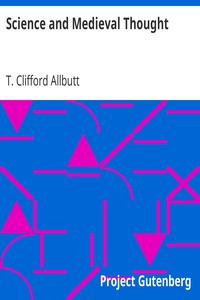Science and Medieval Thought by T. Clifford Allbutt
"Science and Medieval Thought" by T. Clifford Allbutt is a historical account written in the early 20th century. This work presents an exploration of the transition from medieval to modern scientific thought, focusing particularly on the contributions of William Harvey and the surrounding philosophical landscape. It discusses how medieval intellect and theology shaped the development of scientific methodology and inquiry, aiming to reveal the intricate relationship between faith and reason during that
era. The opening of the work introduces the context of the Harveian Oration that serves as its foundation, emphasizing the need to understand the connection between Harvey's discoveries and the medieval philosophical background from which they emerged. Allbutt suggests that while the Middle Ages are often dismissed as a stagnant period for scientific thought, they actually laid essential groundwork for the emergence of modern science. He outlines topics such as the influence of scholasticism, the dichotomy between realism and nominalism, and the gradual shift towards empirical methodologies that characterized the transition into the Renaissance. Throughout, Allbutt invites readers to reconsider the legacy of medieval thought, asserting its vital role in the history of science and knowledge. (This is an automatically generated summary.)
Read or download for free
| How to read | Url | Size | |||
|---|---|---|---|---|---|
| Read now! | https://www.gutenberg.org/ebooks/38943.html.images | 209 kB | |||
| EPUB3 (E-readers incl. Send-to-Kindle) | https://www.gutenberg.org/ebooks/38943.epub3.images | 169 kB | |||
| EPUB (older E-readers) | https://www.gutenberg.org/ebooks/38943.epub.images | 169 kB | |||
| EPUB (no images, older E-readers) | https://www.gutenberg.org/ebooks/38943.epub.noimages | 152 kB | |||
| Kindle | https://www.gutenberg.org/ebooks/38943.kf8.images | 293 kB | |||
| older Kindles | https://www.gutenberg.org/ebooks/38943.kindle.images | 282 kB | |||
| Plain Text UTF-8 | https://www.gutenberg.org/ebooks/38943.txt.utf-8 | 177 kB | |||
| Download HTML (zip) | https://www.gutenberg.org/cache/epub/38943/pg38943-h.zip | 162 kB | |||
| There may be more files related to this item. | |||||
Similar Books
About this eBook
| Author | Allbutt, T. Clifford (Thomas Clifford), 1836-1925 |
|---|---|
| LoC No. | 02010872 |
| Title |
Science and Medieval Thought The Harveian Oration Delivered Before the Royal College of Physicians, October 18, 1900 |
| Note | Reading ease score: 50.2 (10th to 12th grade). Somewhat difficult to read. |
| Credits | E-text prepared by Irma Spehar, Turgut Dincer, and the Online Distributed Proofreading Team (http://www.pgdp.net) from page images generously made available by Internet Archive/American Libraries (http://www.archive.org/details/americana) |
| Language | English |
| LoC Class | B: Philosophy, Psychology, Religion |
| Subject | Philosophy, Medieval |
| Category | Text |
| EBook-No. | 38943 |
| Release Date | Feb 21, 2012 |
| Copyright Status | Public domain in the USA. |
| Downloads | 206 downloads in the last 30 days. |
| Project Gutenberg eBooks are always free! | |


